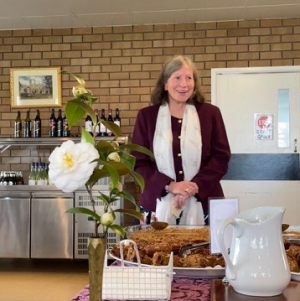Peter MALONE
At Bertram's Hotel/ 1987

AT BERTRAM’S HOTEL
UK, 1987, 110 minutes, Colour.
Joan Hickson, Caroline Blakiston, Helena Michell, George Baker, Joan Greenwood, James Cossins.
Directed by Mary McMurray.
An enjoyable Agatha Christie-Miss Marple story. And, there is a murder only in the last 20 minutes of the film.
Bertram’s Hotel is an anachronism. We see Miss Marple coming up by train to London. We see a BOAC flight landing at Heathrow. Old world and new. This is particularly the case with the hotel, its interiors, style, staff and manners, cakes and tea…
Miss Marple is on holidays but is able to meet with a friend from the past, Serena, a welcome appearance by Joan Greenwood at the end of her long career. But there are some goings-on at Bertram’s Hotel, especially with the woman arriving from America, highly extroverted and showy, played by Carolyn Blakiston. There are issues about her alienated daughter, played by Helena Michel (Keith Michel’s daughter), cared for by her uncle, James Cossins. There is also a policeman lurking during the afternoon teas, spotted by Miss Marple, played by veteran George Baker.
While the style is of the past, preserving the England of the past, there is actually a television room! And there is news of large robberies taking place, prominent people being seen at the scene of the crime, including an absent-minded Anglican canon who is studying at Bertram’s Hotel.
On the one hand, the focus is on the young daughter, meeting her mother, the strange relationship, her mother taking up with a racing driver and the audience discovering that the daughter was also in relationship with him. She also mysteriously disappears for a day. On the other hand, there is the canon, missing his plane to a conference in Zürich, return to the hotel, his disappearance.
There is also a mysterious doorman at the hotel with connections to the flamboyant woman.
Miss Marple, nosy, prim, friendly with the police, but held under suspicion by younger officers, is able to work at all the connections and confront the murderer at the end. Or the alternate murderer!
- The popularity of Agatha Christie mysteries? Miss Marple stories?
- Joan Hickson has Miss Marple? Agatha Christie’s endorsement?
- A mystery, a murder coming very late in the film, the mystery about Bertram’s Hotel?
- Agatha Christie and the atmosphere of the past, the 20s and 30s, Bertram’s hotel recreating this atmosphere, décor, staff and servants, tea and trays of cakes…? But the gradual suggestion that this was a facade? Too good to be true? Issues of change, development? The 1950s and 60s? The train to London, the flight from America, airports, transport, cars and taxis, television…?
- Joan Hickson has Miss Marple, appearance, age, referring to St Mary’s Mead, her nephew shouting her the fortnight at the hotel, her enjoyment, the meals, the meeting with Serena and the conversations, the conversations providing background to so many of the characters and situations? Her noticing Fred Davey, identifying him as police? Her listening to conversations, in the television room, response to best Sedgwick, Elvira? Suspicions of the driver? Observing, taxis, following best Sedgwick and observing her? The discussions with the staff, noticing the type of curtsy from the maid, artificial? The cannon and his absentmindedness?
- The different plots: the background of the robberies, and judge identified, the Irish mail robbery and the cannon identified? Suspicions about the hotel? The final Revelation, Bess managing everything, enjoying the thrill, controlling everyone, the team? The story of Bess Sedgwick and Elvira as her daughter Derek, his Ward, meeting at the airport? Elvira and her friends, behaviour? Her inquiries about her inheritance, the money? Who would inherit? If she died? The mystery of her visit to Ireland and her friend covering for her? Her meeting her mother, her mother seeming disdain? Elvira and her relationship with the driver? His relationship with her mother? The meetings, the rendezvous, the gun?
- Fred Davey, the discussions with Miss Marple, his manner of policing, the efficient young man, questioning people?
- The cannon, absent-minded, going to Switzerland, at the opening, his return, his comment about the mirror, his being attacked, found at home? His BO AC bag? The revelation of the truth, the substitute?
- The confrontation with Bess, her confessing to running the organisation, her exhilaration, the previous scene with her driving recklessly, her escape over the roof, taking the car, the crash?
- Michael, Irish, the past, the marriage to Bess, his being bought off, the Army? At the hotel? Confrontations with Bess? His being shot, the drivers gun?
- The driver, arrested, interrogated, the accusations?
- Miss Marple, with Elvira, her visit to Ireland, the truth about her mother’s marriage, the issue of inheritance, the gun, shooting Michael?
- Bertram’s hotel, the relic of the past, the cover for the robberies, the unmasking, the transformation of the hotel?
- A satisfying Miss Marple mystery?
Michelle Vass, Gratitude, Tribute, Retiring Retreat Centre Director (2016-2022) St Mary’s Towers
Michelle Vass, Gratitude, Tribute, Retiring Retreat Centre Director (2016-2022) St Mary’s Towers
Dominic Gleeson MSC, Celebration, July 23rd.

The story of Michelle’s journey with St Mary’s Towers, Douglas Park, began at the turn of the Century. In the early 2000’s Michelle first visited the Towers with the intention to pray a retreat, allowing her time to make space for and give expression to her burgeoning thirst for God, deeply embedded within her. Michelle’s first spiritual companion and guide for the retreat was Paul Brennan, msc. Michelle was moved deeply by the touch of God on her heart from that experience and was inexorably drawn back to this place of the Heart for many more retreats.
It was during these experiences of retreat Michelle began to feel an affinity with the spirit of the land – the place of the D’harawal people, the traditional custodians of this land, and the spirit/charism of the Society of the Missionaries of the Sacred Heart – “May the Sacred Heart of Jesus be Everywhere Loved”. In the years that followed Michelle was able to capture many jewelled facets of the land through the lens of her camera – resulting in thousands of images, some of which hang in various rooms in the retreat centre to this day. Michelle was able to gift to retreatants and all who visited the Towers with an inner experience of the gift of God who was being so wonderfully expressed and described in the outer, natural, and created world – to a place deep within.
Michelle had from those early days a thirst for silence which, as all of us MSC, visitors and retreatants know, is in plentiful supply at St Mary’s Towers! As the years passed Michell’s yearning for the silence grew and grew. It was in that silence that Michelle kept being drawn back into the Heart of the One who calls. It also helped that the tradition of St Mary’s Towers being a place of silence assisted Michelle and affirmed her in her quest to draw water deeply from the well of God’s life-giving spirit.

Michelle, her son, Chris with Chris McPhee.
Michelle has always been moved by a prayerful, mystical silence – and it is that same silence as expressed by St Jerome - “Silence is praise for You – silentium tibi laus” (St Jerome’s translation of the Hebrew Psalm 65:1). During the times of retreat, enjoying the solitude, spiritual accompaniment, the flora and fauna and all that nature has to offer, walking with the land, Michelle was partaking of the silence and plunging into everything that the Towers was offering.
Complementary to the above was that in 2002, Michelle completed a Master of Arts (Theology) at the Australian Catholic University Canberra.
As Michelle’s yearnings deepened to welcome more fully the invitation to walk with Jesus as confidant and friend, Michelle undertook further studies in 2008 in the area of Spirituality and Pastoral Ministry (specifically the practice of Spiritual Accompaniment).
Michelle believes passionately that there is a need to recover and allow to emerge, new creative ways of contemplative living based on the richness of our Christian heritage. In a special way it is through the Spirituality of the Heart that we keep in touch with the living, loving power of God, and find the freedom to do this.
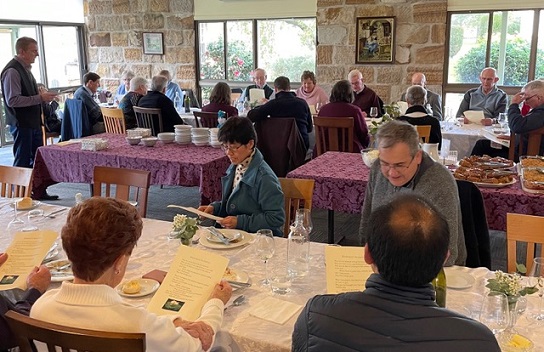
Tribute from Dominic.
In 2011, Michelle applied to a position to join the Retreat Centre staff and to be on team to share her expertise in facilitating retreats and in offering spiritual accompaniment. Retreatants often remarked that Michelle’s retreat presentations were ‘world class’. Doug Smith, msc, was the Retreat Centre Director at the time and one of the first demands made of Michelle from Doug Smith was that Michelle was a good fire starter for the retreat centre Heart Room’s fireplace! Having excelled in the art of fire lighting Michelle continued to go from strength to strength.
During the year 2016, Michelle was offered the position of Retreat Centre Director and instantly she was given the responsibility of facilitating the Retreat Centre’s first sabbatical program – which was a great success. Michelle led her ‘beauty crew’ (Retreat Centre team), through a myriad of advances to the Retreat Centre program, including innovations in technology, development of a website, comprehensive updating of the MSC, Life’s Healing Journey retreat, creating several new team and individually presented retreats per year. Michelle guided and led the team, the retreatants, visitors and live-in community through bushfire seasons, floods, and the pandemic (continuing) with wisdom and courage.

Communal blessing.
Michelle was able to develop and foster a large group of spiritual directors across Australia to become an extended Retreat Centre team thus creating rich variety, and choice. Michelle is passionate about reading, professional development and policy. Michelle’s balance and her strong sense of accountability helped the Retreat Centre team to be at the forefront to the many opportunities in professional development and standards.
Michelle considered it a special blessing to work with the retreat team at St Mary’s Towers, building on the wonderful tradition of profound silence, and serving the needs of those who come here seeking solace, peace and the love of our compassionate God. Michelle believed that the St Mary’s Towers Retreat Centre, named after Mary our mother and sister in faith, is a ministry of the Missionaries of the Sacred Heart. Mary’s example of pondering and beholding the presence of Jesus in her heart remains an inspiration for us today as to how to let Christ be a loving presence in our hearts, for our world.

Of significance and of paramount importance and value, however, was Michelle’s contribution to the life of the MSC community. Michelle is and always will be a true Missionary of the Sacred Heart, filled with grace and inspiration – and a truly great friend and companion to the professed MSC and all who visit. Michelle welcomed all as family!!
Our prayers go with you Michelle as you venture into your own sabbath time, and may God bless you abundantly for the great woman of substance you are and will continue to be in all that you are and do.
PS, some visual envy of the catering.

Where the Crawdads Sing
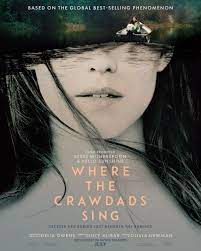
1. Wide popularity of the novel? Adaptation? Audience expectations?
2. The North Carolina settings, the marsh, the swamps, location scenery, bird and creature life, the home, Kya’s heart? The town, prison, the court? The musical score?
- The title, evocative, the marsh, remoteness, the birds, singing? Kya and her refuge in the marsh?
- The story as murder mystery, the opening, Chase, his death, the tower, the hole, blood and hair evidence, no footprints, no clues? The arrest of Kya, her age, reputation, attitude of the town, in the cell, Tom and his visit, offer of help? Her opening up?
- The transition to the bulk of the film as a portrait of Kya, the flashbacks to her childhood in the marsh, mother and suffering, leaving, brothers and sisters, departure, her cruel father, his background in the war, aftermath and stress? Alone with her father? Her age, the 1950s, the boat, observing nature, the encounter with Tate, the sharing of feathers, the bonding? Her living in isolation?
- Going to the store, Mabel and Jumpin, their friendship, helping, her collecting the mussels, exchanging them for goods? Her being able to go to them for support? The presence in the court?
- The return to the murder issue, the court sequences, the prosecution and attack, the jurors, chases mother and her bitterness, Tom and his defence, calm? Reassuring Kya?
- The return to the portrait of Kya, the early 1960s, her father’s disappearance, living alone, making a home for herself, shy, withdrawn, her sketches? The encounter with Tate, the friendship, sharing, feathers, her falling in love, Tate and his age, prospects, scholarship, science and investigations, bond with his father? Love for Kya, the sexual encounter, his respect for her? His promise, leaving, disappearing? Her hurt?
- And the return to the court, the further evidence, the reconstruction of the scene? Kya, her alibi, travelling to the conference, staying away from the town? The implausibility of her returning to kill Chase?
- The further portrait of Kya, age, her disillusionment with Tate, the encounter with Chase? Chase, his personality, coming on to her, his friends, talk, the final revolution revelation of his engagement? The outings with Kya, her attraction, shared experiences? A different world? Her anger with him? His coming onto her, the sexual aggression, her rejection, strong stance?
- Her brother’s return and her joy, learning about her mother?
- Tate, the addresses of the publishers, her keeping it, later sending to the publishers, the range of sketches, their acceptance, money issues and her wanting to buy the rights to her house, the further books, promotion in the town? The conference, the testimony in court of the publisher?
- The acquittal, Tate and his return, asking forgiveness, her mellowing? His presence in the court?
- The passing of the years, quickly, marriage, celebration, children, the continued work and observations, the couple getting older, Kya and her death, Tate looking at her sketches, the book, the sketch of Chase, her labelling him as the predator? And the solution to the mystery? Tate’s bewilderment, the audience’s bewilderment?
4.50 from Paddington
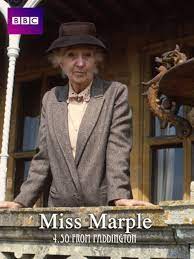
4:50 FROM PADDINGTON
UK, 1987 100 minutes, Colour.
Joan Hickson, Jill Meager, Joanna David, Maurice Denham, David Beames, David Horovitch, Andrew Burt, John Hallam, Alan Penn, David Waller.
Directed by Martyn Friend.
One of the readers' favourites of Agatha Christie novels. It was actually made into a film, serious but rather rollicking in its tone, during the 1960s, Murder She Said. And it introduced Margaret Rutherford, rather unexpectedly, as Miss Marple, who then starred in three other sequels, along with Bad thing will as the police officer. Arthur Kennedy and Muriel at low was in support and the juridical old father was played by James Robertson Justice. And, with Ron Goodwin’s jaunty score, entertainment for all (even Agatha Christie who was dismayed at the news of Margaret Rutherford’s playing Miss Marple but who then dedicated the Mirror Crack’d to her).
Jaunty is certainly not a word that one associates with Joan Hickson. She is the sharp spinster, nosy, no real sense of humour, Miss Marple personified.
There is a murder on the train and Miss Marple’s friend sees it. Miss Marple then intervenes, getting her niece, Lucy, to work at the mansion near the rail line with the place, trapped try to find the body. Eventually, she does. But the audience has been introduced to a strange household, a dominating old man, played by Maurice Denham, his devoted daughter, Joanna David, and three sons – all with some suspicious background. And there are two young boys at home for mid-term break. And, a local exasperated policeman not fond of Miss Marple’s interventions, David Horovitch, but a more genial Inspector from Scotland Yard, who invites Miss Marple into discussions, David Waller.
Various complications about World War II, a dead brother’s relationship with Frenchwoman, a dead ballet dancer, and unravelling a plot which most audiences could not have foreseen. (Unfortunately, when the murderer first appears in the film, that is after the murder, is wearing the same overcoat as he did on the train, something of a giveaway even though we need a rather explanation of how he could possibly be the murderer!)
A reminder of how effective Joan Hickson was as Miss Marple.
- The popularity of Agatha Christie novels? Miss Marple? The book classic? The Margaret Rutherford version?
- Agatha Christie’s technique, the situation, the murder, the clues, the range of characters, possibilities, investigation, intervention by Miss Marple, her leads, the untangling of the plot, the final explanations and the elaborate plot unsuspected by the audience?
- Joan Hickson as Miss Marple, the embodiment of Agatha Christie’s perspective on Miss Marple? Age, St Mary Mead, nosy, intervening, putting things together, solutions? But always the little old lady?
- The opening, the Catholic background, the church, the woman praying, the man following her, his coat, in the train? Mrs McGillicuddy and her fuzziness, the later train, the parallel trains, the window, her seeing the man strangling the woman? Upset? Visiting Miss Marple, the discussion?
- Miss Marple, her character, intervention, Lucy is her niece, the elaborate plot for Lucy to be employed at the house, Lucy, her personality, charm, meeting Emma, Emma relying on her, Luther, the eccentric, his fuzziness, peremptory manner? Lucy and her cooking, calming situations? The two boys for holidays and enjoying her cooking, friendship? Brian, the attraction, her telling him what to do, her impatience with him? The other members of the family? Cedric, the artist, his coming onto her?
- The mystery of the murdered woman, Lucy and the pretence of golf, countryside, finding the fluff in the bushes, the hoarding of the statues, the tomb, the fluff, finding the body? The doctor, his attending Luther, removing the body, diagnosis, autopsy? His attention to Emma, the attraction?
- The lawyer, explaining to Miss Marple the gathering of the clan, the eccentric will, the elimination of all those inheriting, the last survivor inheriting all? Harold, the bank, hard times, wary, going hunting, in the trap, his death? Freddie, shady deals, his illness, discussions with Emma? Emma and her devotion to her father?
- The police, steady on the job, the experience with Miss Marple, impatience, the Inspector from London, friendship with Miss Marple, deciding that she should be part of all the investigations?
- The story of the brother dying during the war, the letter from his widow, further investigations, checking documents? The build of the dead woman, Miss Marple suggesting she was a dancer, the inspector visiting the company, the interview with the manager, identifying the dead woman?
- The further developments, Miss Marple and the investigations in France? The false letter, the gathering of everybody together?
- Miss Marple, the explanations, the clues towards the doctor, pretending to choke and the image of the strangling and Mrs McGillicuddy’s reaction, his unmasking, attempt to escape?
- A complicated plot, Miss Marple collaborating with the police, the solution?
Official Competition
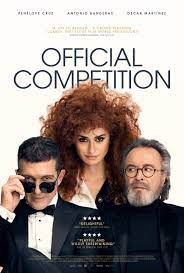
OFFICIAL COMPETITION
Spain, 2021, 114 minutes, Colour.
Penelope Cruz, Antonio Banderas, Oscar Martinez.
Directed by Gaston Duprat, Mariano Cohn.
‘Cynical ’is the word that keeps coming to mind while watching Official Competition. In fact, in retrospect, it is very cynical. But, of course, with satire, cynical can be entertaining.
The film opens interestingly with an entrepreneur turning 80, wondering whether he should invest his money in some kind of legacy in his own honour, for instance, the building of a bridge in his name and his dedicating it. But, he also has the idea of investing in a prestige film.
This is very much an interior piece, mainly three characters, at meetings with readings of the screenplay, rehearsals, performance.
And, what sustains it is the presence and performance of three top Spanish stars. And the big surprise is not that Penelope Cruz is in the film. Of course she would be, but in the role that she plays. She is a prestigious film director, Lola, winner of awards. And she is invited to be the director of the hoped for successful film, the entrepreneur having paid a small fortune to negotiate the rights for a novel, Rivalries, to be produced.
The director has the inspired idea to cast a very popular International Spanish star, Felix, as one of two brothers. And, of course, Antonio Banderas exemplifies that in his own life. His character in the film is something of a parody of his own career. The other actor to be cast comes from the stage, highbrow, prestigious, Ivan (played by Oscar Martinez).
Back to the cynicism! The screenplay presents us with three quite obnoxious characters, not at all likeable and, when the screenplay tends to think favourably of each of them, we realise that we have been tricked and are disillusioned.
Already at the first reading, Lola is finicky, making demands of each of the actors to repeat even the most basic lines until she is satisfied – already a challenge to their egos and pride. She is really a character you would not want to meet in real life. And things can get worse at times of rehearsal, her criticisms, testing them. The big ordeal for them, and for audiences who might imagine themselves in a similar situation and how they would react, Kerns when she binds them together in plastic, so that they become one character, and, with the range of awards and statuettes they have brought in, she puts them into a grinder. Frustration – and more.
Which leads them to quite some mean-mindedness on the part of each of the actors, performance (which, at least, this reviewer saw as performance rather than a genuine story) which is meant to touch the others’ emotions. Then a different kind of performance to touch emotions. Each a hoax, of course, and the repercussions on each of the three.
There is a final rehearsal performance of the climax of the film, a reminder of the title, Rivalries, the story of two very different brothers, and the relishing of a shock ending.
And the title of this film – the finished work is accepted for a film festival, but there has been quite a sinister interlude, among the glitterati, which means that the film, as finally made, is not what anybody actually expected.
And just while Lola makes a speech, while the entrepreneur is very happy, there is a plot development as the film ends – which makes us very curious as to what might actually have happened if the film had gone on…
- The title? Filmmaking? Processes, performance, filming, release, competitions?
- The Spanish setting, the pharmaceutical company and the Boss, to build a bridge in his honour, financing the film? Press conferences? The media? The filmmaking, the locations, studios, theatres in stages, rehearsals? Homes sequences? The finale and the film festival?
- The cynical tone of the story, the characters? Cynicism in the professional world, the irony of the film called The Rivalries?
- The entrepreneur, the opening, his speech, turning 80, his plans, his secretary? The decision about the film? The expense of the rights to the novel? Hiring Lawler, the actors, the adaptation of the novel, discussion about the plot, Lola explaining the details of the plot – except for the ending?
- Lola, her reputation, Penelope Cruz, her appearance and style, clothes, hair, manner, speaking, her staff at her treatment of them, expectations? Ego? Her plan for the film, calling the actors, meetings, treatment, the readings, her interrupting immediately, her demands, repetitions, satisfaction? Their interpretations of the characters? The testing them, wrapping them together, helpless, their bringing all their awards, her putting them in the grinder, the reactions? Her continued tests? Felix a story about the cancer, her compassion? Her revenge, delays? The discussions with Ivan, his praising of Felix, performance?
- Felix, Hollywood star, reputation, life, women, awards? In rehearsals, his being corrected, Lola’s demands? The encounter with Ivan, his reaction to him? The readings? Professional jealousies? The episode with the awards and his frustration? His performance about having the cancer? Ivan and his apology and Felix accepting it? The final rehearsal, the scene, the two brothers, interacting, Lucy and the child, the embrace, the stabbing, the disposal of the body, manual transforming to Pedro, clothes, going into the house? The two as one person (Lola’s interpretation), the consequence of the rivalries?
- Ivan, age, children, marriages, star of theatre, his reputation, self-image? Ego? Agreeing to be in the film? The encounters with Felix, despising him? Lola making demands on him in rehearsals, repetitions of lines? Interacting with Felix? Being bound together, the episode with the awards, the award given to him by the disabled children? His believing Felix about the cancer? Yet his googling about the whitening of teeth? His speech of apology to Felix – a performance?
- The party, the speech by the entrepreneur, Lola’s speech, enigmatic about films? Ivan, drinking, his denunciation of Felix, Felix and the hearing, going to the roof, the struggle, Yvan falling, Felix pretending to arrive?
- The consequences, Ivan having suggested he could do both parts, Felix doing both parts, Yvan in coma, the press conference, Lola and her style of answering the questions or not? Felix and his insincere speech about Ivan? Ivan coming to consciousness and saying Felix’s name?
- The cynical and satirical look at ego, eccentricities, filmmaking, pretentiousness, the response of the public, the critics?
Nemesis/ 2009
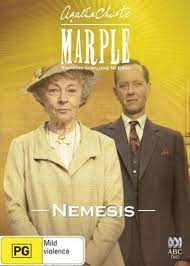
NEMESIS/Geraldine McEwan
UK, 2009, 100 minutes, Colour.
Geraldine McEwan, Laura Michelle Kelly, Dan Stevens, Richard E.Grant, Ruth Wilson, George Cole, Ronni Ancona, Adrian Rawlins, Emily Woof, Ann Reid, Amanda Burton, Lee Ingleby.
Directed by Nicolas Winding Refn.
Nemesis is based on an Agatha Christie’s Miss Marple novel, Miss Marple being named by a deceased character as his Menaces. And, making a recording, 1950 setting with flashbacks to 1940 in the Battle of Britain, he bequeathed to her a mission to rectify a past crime. She is sent two tickets for a mystery bus tour and she approaches her novel-writing nephew, who has more than an eye for the ladies, to accompany her and help in the investigation.
Essentially, the story is the bus tour and the various significant locations to which the passengers travel. And, it soon emerges, that they are all connected in some way. They include several couples, and German former Luftwaffe pilot, interned during the war, to nuns…
There is an interesting range of character actors playing these roles. Miss Marple, in the Geraldine McEwan films, is much more benign looking, a kind voice, less sharp than the performances by Joan Hickson (who does seem to be Miss Marple incarnate). Entertainingly good is Richard E.Grant as her nephew. Ruth Wilson strong as the bus driver, Ronni Ancona overdoing the histrionics as a self-important wealthy woman, Dan Stevens as the German pilot, Ann Reid and Amanda Burton as the nuns, George Cole as a former butler.
There are also two murders during the trip. And, as with Miss Marple, she follows the leads, follows the suspicions, confronts people, and unmasks the killer.
This version of Nemesis was not well received, a criticism that there was too much alteration of Agatha Christie’s text, blood sisters turned into religious order sisters (and some culminating shocks!). This version also can was compared very badly with the acclaimed Joan Hickson version of 1987.
But, one of the shocks is to find who the director is: Nicholas Winding Refund, the Danish director best known for his tough drug dramas with Mads Mikkelson, his very strong prison drama, Bronson, making us staff of Tom Hardy, and his international tough films including drive, God Forgives, Neon Demon. One does not associate this writer-director with Agatha Christie!
Daramalan College Past Students. Achievements, Art, Sport, Student Activism
Daramalan College Past Students. Achievements, Art, Sport, Student Activism
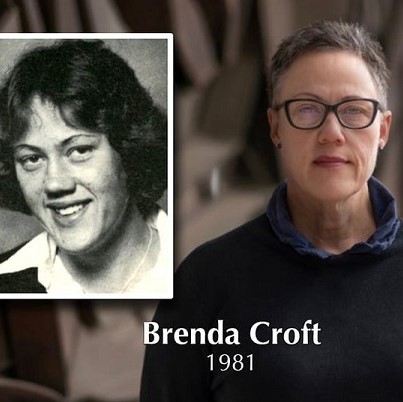
WHERE ARE THEY NOW – USA (UPDATE)
Brenda Croft from 1981, currently a leading First Nations artist and scholar from the ANU, has been awarded the Gough Whitlam and Malcolm Fraser Chair of Australian Studies at Harvard University for the 2023-2024 academic year. Yep, THAT Harvard, America’s oldest and most prestigious University. The award will see her as the inaugural First Nations woman to take up the role. Impressive!
Brenda is from the Gurindji/Malngin/Mudburra peoples from the Northern Territory, with Anglo-Australian/ Chinese/German/Irish heritage.
Her new role will see her teaching and researching between the Department of History of Art and Architecture, and the Department of Art, Film, and Visual Studies, while also engaging with colleagues in the Harvard University Native American Program.
Brenda recently completed her PhD and is now Professor Croft at the ANU College of Arts and Social Sciences. The Dean of the College, Professor Rae Frances stated, "We are especially proud to be represented by such a talented Indigenous scholar whose work will do much to communicate the rich culture and history of Australian First Nations people to a US audience." The Daramalan Alumni totally agrees!
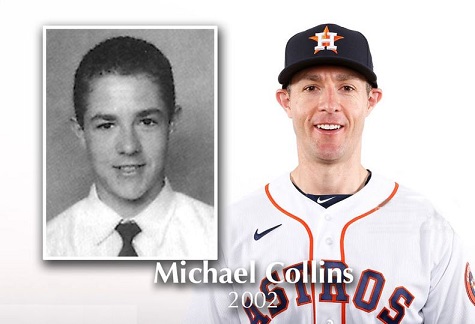
DID YOU CATCH THIS STORY?
You may have seen the article earlier this week concerning an Atlanta Braves' baseball player, who, in game one of the US World Series, amazingly threw 16 pitches against the Houston Astros with a broken leg. Now ignoring the dodgy femur for a moment, the Dara connection is that the Astro’s catcher is coached by our own Michael Collins, Class of 2002.
Michael has been involved with US Major League Baseball since leaving Canberra after a long stint with the Canberra Cavalry as both player and manager, including coaching Australia’s national team in 2013.
With the Astro’s currently in the finals, we look forward to Michael’s team taking out the 2021 World Series – with all legs intact hopefully.
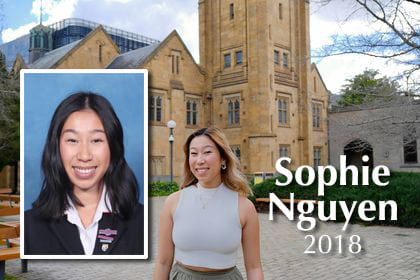
OUR SOPHIE HAS ‘TRUMPED’ THIS PRESIDENT GIG
It takes a certain person to make a great leader and clearly a Dara education is the perfect training ground for success. Ex-student Sophie Nguyen (2018) is currently completing her Bachelor of Arts at the University of Melbourne, and has just been elected as the 2022 President of the university’s Student Union, acting as the face and spokesperson for the 50,000 strong student campus. She will be representing the students on all matters relating to services, activism and events, as well as working with other student unions on national campaigns. It must have been all that experience she gained as Lyons House Captain back in Year 12.
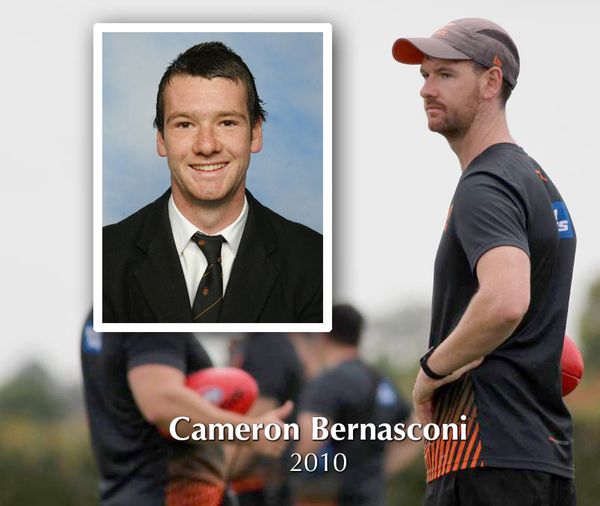
CAM’S JUST REACHED HIS GOAL
Ex-student Cameron Bernasconi (2010) was always destined to be a success in the AFL, and his dream came true last week when he was appointed Head AFLW coach at the GWS Giants for the next three years.
Cam’s career trajectory started straight after school, with a short stint at GWS as a player, before being chosen as an AFL coaching clinic trainee in 2013.
He was then appointed as ACT's Talent and Coaching Manager, before moving into a similar role with the Giants Academy, later taking on the Academy's head coaching gig in 2020 before his latest appointment.
He also becomes the second local AFLW coach with Canberra girl Bec Goddard heading up the Hawthorn team which should make for an interesting match-up when the next season starts in August. Cameron, and his brother Matt, are part of a long-term Dara family with both his dad and uncle also attending the College in the 70s.
Grosse Freiheit/ Great Freedom
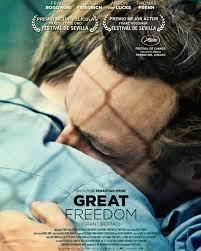
GROSSE FREIHEIT/ GREAT FREEDOM
Germany, 2021, 116 minutes, Colour.
Franz Rogowski, Georg Friedrich.
Directed by Sebastian Meise.
The freedom focus for this sombre drama is the history of legislation concerning homosexuality, especially in Germany.
The film opens with 16mm film being projected, a toilet, a “cottage”, frequented by men for pickups and sexual activity. It is being screened at the case against Hans Hoffman (a powerful performance by Franz Rogowski) who is condemned to jail. It is 1968. And the number of the legislation, 175, is prominent in the prison to indicate the reasons for the prisoner being in jail.
The film goes through the usual processes, humiliating of the prisoner, stripped and search, prison clothes, the cell. Hans is placed in a cell with Victor, homophobic, tough – but the plot revealing that they have been several times in prison together, beginning in 1945.
The action goes back to the prison in 1945, Hans being released from a concentration camp where he was interned because he was homosexual, liberated by the Americans but nevertheless sentenced to continue his term in prison by the Allies. Later the film will move to 1957, the indication being that Hans is in and out of jail, and, once again, he encounters Victor.
1945 sees the young Hans, the experience of the concentration camp, a number on his arm which Victor, despite his homophobia, offers to blot out with tattoo ink. There is a bond between the two. Victor works in the kitchen, bringing meals around to the various cells. Hans has a talent for sewing which is his occupation each time he is in jail.
In 1957, Hans encounters a friend, Oscar, and tries to make contact with him, using a Bible in which he pricks points which, when held to the light, contain a message. Victor, initially unwilling, taking the meals around, eventually, curiously, persuades Hans to fellate him. He then delivers the message to Oscar. However, after the two meet, love for each other, Oscar works on the roof, kills himself by throwing himself from the roof.
In 1968-69, there is a young teacher and mutual attraction between him and Hans, Hans arranging that they defy some regulations for identification at night and are relegated to a common cell where they have a sexual experience. Hans is sorry for the teacher, makes a declaration that he approached the teacher for forcible sexual activity – and the teacher is freed.
In the meantime, Victor is in his usual occupation, a drug addict, eventually revealing the story of why he is in prison, a murder of a woman, the possibility of his going on parole but showing his innate fear and his drugging himself instead of going into the hearing.
1969, the prisoners watched the moon landing. Hans sees the front page of the newspaper with the information that 175 has been repealed. Which means that he leaves prison, leaving Victor in prison, and goes to a gay club, Great Freedom, experiencing the change for his life and his legal status as homosexual.
In some ways, the serious film is semi-documentary, a portrayal of life in prison without conventional sensationalism, the experience of prisoners, especially solitary confinement (with a number of sequences just filmed in blackness as Hans is put in solitary, darkness, some matches and flame, just the sounds in the darkness).
Man in the Basement/ L'homme de la cave
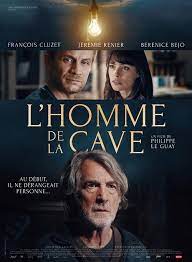
L’HOMME DE LA CAVE/ MAN IN THE BASEMENT
France, 2021, 114 minutes, Colour.
François clues A, Jeremy Renier, Berenice Bejo, Jonathan Zacccai, Victoria Eber, Denise Chalem, Patrick Descamps, Laeticia Eido.
Directed by Philippe le Guay.
- the title, the focus on Fonzic? The initial enigma, wanting the basement, his reasons, stories, lies, his character and motivations?
- The French setting, World War II history, the history of the Jews in France, the roundups, concentration camps, collaborations and betrayals, ownership of shops and apartments, the post-war situation? The long tradition, Jewish memories, continuing anti-Semitism?
- The Sandberg family, Simon, his position, personality, relationship with Helene, their daughter and her attitudes? The visits to his parents, the meals? His brother, ups and downs, unreliable? Ownership of the house, the traditions, 1942, the loss of the house, gained after the war? The photos and memories?
- The decision about the basement, the sale, the visuals, downstairs, the long corridors, the basement hidden away, small? Fonzic and his appearance, the discussions, wanting the basement, the later meetings, his offering of immediate payment before the signatures? His ownership of the basement? No legal recourse?
- Fonzic, the gradual revelation of his character and stances, critical, wanting the truth, Holocaust denier, looking at evidence, modifying the facts, different interpretations? His point about the massacre of 12 million Native Americans in the 19th century? His past as a teacher, Simon going to investigate, learning the truth, forensic losing his job? His writing, investigations, the anti-Semitic slurs, graffiti?
- Simon, the reaction to the news about From sick, the meeting, the sale irrevocable? The effect on him, a panic, anger, wanting to go into action? Helene, Catholic background, her reaction, identifying with Simon, the effect on her attitudes and mental health? The daughter, warned against From sick, the discussions with him, the 12 million Native Americans, her reactions, his encounters with her, taunts?
- Simon and his reaction, boarding up the toilet, from sick and his behaviour, sanitary, going to the public baths? Eating locally? The confrontations with Simon? His brother, wanting to react? The parents, the discussions, the ownership of the house, surfacing the stories of the past?
- Audience sympathy for the Sandberg family, the response to the anti-Semitism? Dislike of Forensic? Yet from six behaviour bringing out a kind of fanaticism in the family?
- Audience dislike of forensic, the issue of the right to freedom of speech, freedom to expound error, hurt speech?
- The repercussions for forensic, French law, atmosphere, his freedoms?
- The repercussion for the Jewish family, the memories of the past, reliving the past, on the defensive, aggressive?
- The end of the film leaving audiences without clear answers, moral dilemmas?
Press Play
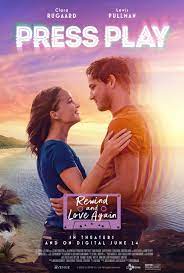
PRESS PLAY
US, 2022, 85 minutes, Colour.
Clara Rugaard, Lewis Pullman, Lyrica Okano, Christina Chang, Danny Glover, Matt Walsh.
Directed by Greg Bjorkman.
Definitely one for the romantically-inclined. With a major appeal to audiences in their 20s. There are some parents and a mysteriously wise advisor played by Danny Glover, but the focus is very much on the young. And, probably safe to say, not for the non-romantically-inclined!
The central character is Laura, played by Clara Rugaard, an artist, with up-and-coming hopes. She hangs out with her friend Chloe (America Carnot) whose interest is definitely not art. Beach boys cross the street and she is immediately after them. However, she does fall in love with one of them and marries. But, she is very keen on setting up Laura with her brother, Harrison, Lewis Pullman.
Audiences who are waiting for some conflict may be set back a little when the two actually fall in love – rather quickly. And the bond between them is music, a play-list, on small cassettes from the past. Harrison works in a record store which buys back tapes for cash from people had created them in the past and no longer need them. They are displayed on a special shelf. In the meantime, Lewis has ambitions to study medicine.
Then, we are rather taken aback, as is Laura, when Harrison is killed in an accident. This is not a spoiler because the rest of the film depends on this episode.
Laura is sad, time passes by, she mourns Harrison, is not in touch with Chloe and her family as she should. But there was also the wise advisor, the old man, friend of Harrison, who talks with her, helps with the music – but also has a mysterious aura.
There have been a lot of popular movies playing with romance and time, going back into the past, parallel universes, think About time, think In Time, remember aspects of Ghost, and aspects of Groundhog Day.
Which means then that we live Laura’s strange experiences, the playlist, playing the music, going back into the past, and her encounters with Harrison, trying to save him, always in love – but, then her appearing and disappearing in the past and in the present, depending on the music.
So, it will depend on how happy you want your ending to be, love and romance all over again, or Laura to accept reality and to face her future. What would we choose!
- Romantic? For audiences in their 20s? Older adults remembering!
- The settings, American, the beaches, the shops, homes?
- Of the music, the score, the play-list, the actual songs, the connections, the moments they are played, the effect?
- Laura’s story, age, artist, friendship with Chloe, the setup for Harrison, meeting him, the record store, the discussions of music, the tapes, falling in love? The meal, his parents, the news about his medical studies and scholarship? Her reaction, the reconciliation? Her own scholarship and hopes?
- Harrison, age, the store, music, home and parents, Chloe, the encounter with Laura, falling in love, sharing the music, the surfing, his accident?
- The wise old man, the store, friend of Harrison, conversations with Laura, advice? Laura later going to meet him, his advice, giving her the tape, his regrets that she didn’t visit?
- Chloe, friend, boys, following them to the surf, falling in love, the wedding?
- The aftermath of Harrison’s death, Laura grieving, separating herself, not visiting Chloe?
- The music, playing the tapes, the fantasy atmosphere, going back into the past, the encounters with Harrison, warning him about his death, the earthquake? Going back to different times, falling in love? The past, time travel, parallel universe? The effect on Laura? Discussions with the old man?
- The opening of the film, the mysterious touch, the record, Laura disappearing, Chloe searching for her? The reprisal of the scene, its meaning, Laura having to make decisions, to go back into the past, to let Harrison go, to live in the present?
